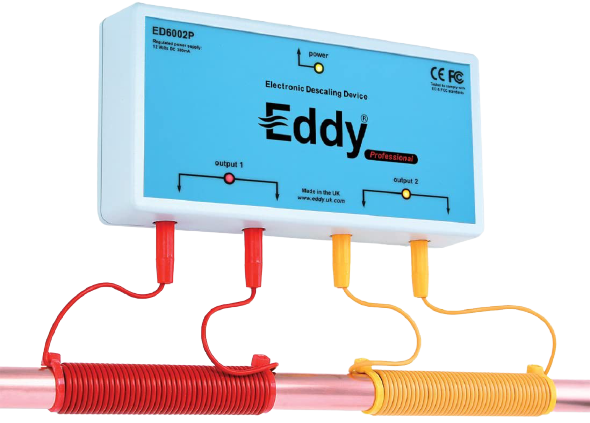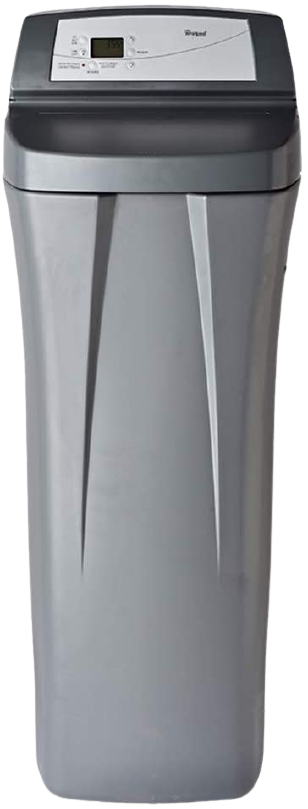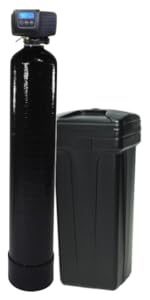|
Springwell Salt-Based System |
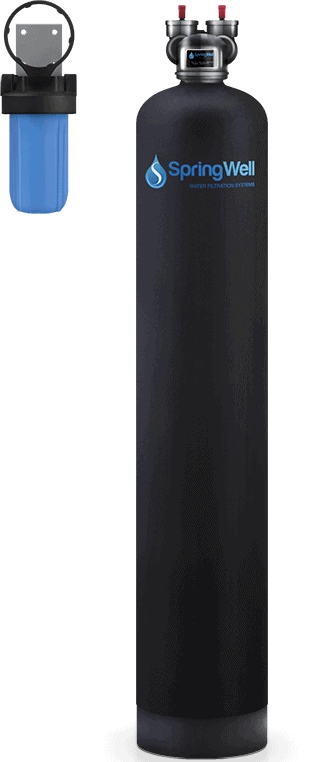
SpringWell FutureSoft FS4 |
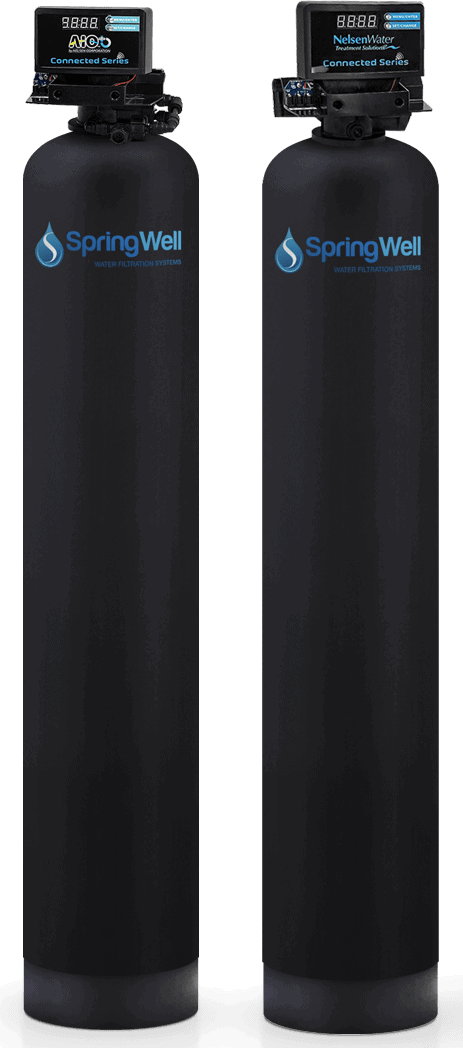
Springwell Iron Filter/Softener |

|
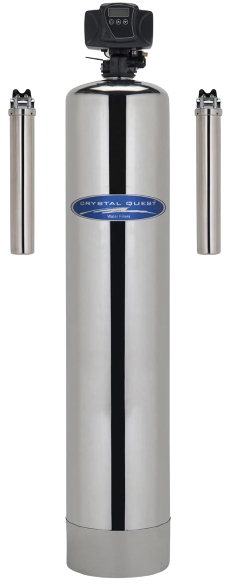
|
|
|
|---|---|---|---|---|---|---|
Best salt-based water softener– 5.0/5.0 ★ |
Best salt-free water softener– 4.5/5.0 ★ |
Best softener for well water (iron)– 5.0/5.0 ★ |
Best filter-softener combo– 4.6/5.0 ★ |
Runner-up filter-softener combo– Ion-exchange |
Best electronic softener– 4.2/5.0 ★ |
Best budget water softener– 4.5/5.0 ★ |
Hard water is a common issue in many homes. When minerals such as calcium and magnesium dissolve into the water supply, they can be carried through plumbing and cause problems.
Mineral scale builds within pipes and home products like dishwashers and laundry machines. If appliances aren’t regularly cleaned, this can result in reduced performance. When mineral deposits are left to build for a long time, hard water may cause catastrophic leaks.
A quality water softener is a great investment if you notice chalky residue on dishes, scale buildup on faucets, reduced water heater performance, or dry skin and hair after a shower.
Hard minerals like calcium, iron, and magnesium are reduced by water softeners. These devices remove minerals from the water supply using salt-based ion-exchange technology, or they condition mineral water so that it no longer leaves scale on surfaces. This is especially common among homeowners on a well system, where a heavier duty water softener for well water is recommended.
What’s on this page?
These 15 water softeners are the best-of-the-best when it comes to performance and value, according to consumer research, expert reviews, and web comparisons.
Below, you’ll find reviews of salt-based softeners, salt-free water conditioners, well water iron softeners, and filter-softener combos:
- Best salt-based water softener – SpringWell Salt-Based System (5% off with CLEAN5)
- Best salt-free water softener – SpringWell FutureSoft (5% off with CLEAN5)
- Best for well water (iron) – SpringWell Iron Filter & Softener (5% off with CLEAN5)
- Best filter-softener combo – Aquasana Rhino with Conditioner
- Best budget water softener – Whirlpool Pro Series
- Best electronic water softener – Eddy Electronic Water Descaler
How to choose a water softener
Water softeners are classified into three main types:
- salt-based
- salt-free
- magnetic
The most often used systems are salt-based water softeners. They function by an ion-exchange mechanism in which hard minerals in water are pulled into a resin bed where they are attracted to and exchange places with soft sodium ions (salt).
While ion-exchange softeners are the most efficient, the soft water produced contains very minute quantities of additional salt. The system will also need to be replenished with salt on a regular basis. The size of a salt-based water softener is considerably greater than that of other kinds of systems.
For most households, particularly those with hard water, we suggest a salt-based softener (over 7 GPG).
Instead of eliminating hard minerals, salt-free water softeners use a process known as template-assisted crystallization (TAC), which stimulates minerals to form crystals, preventing them from bonding with surfaces and leaving the water supply. Salt-free water softeners are more expensive, but they are smaller and do not need refills.
Salt-free conditioners are ideal for houses with low-to-moderate water hardness, as well as those searching for a low-maintenance solution.
Magnetic or electric water softeners are attached directly to the exterior of water pipes and employ a magnetic field to change the way hard mineral bonds are formed. This, like water conditioners, prevents minerals from developing scale. Electromagnetic water conditioners do not need tanks, making them ideal for flats and other tiny places. They also do not need a cut into the water line to be used, making them a practical choice for renters.
Electromagnetic conditioners are recommended for apartment tenants.
Although hard water does not pose a health danger, it may create a number of problems in your house. Even after cleaning, bathroom and kitchen equipment acquire scale and seem unclean.
On glasses, plates, and silverware, water stains and clouding emerge. Scale builds up in coffee makers, dishwashers, and water heaters, limiting their heating capacity.
Hard water lowers the lathering of detergents during washing and makes it much more difficult to rinse the detergent away from the garments. After washing, the skin may feel covered with a film.
Hard mineral buildup in pipes causes clogging, which may lead to pressure, blockages, and leaks.
Following the selection of the appropriate kind of water softening system, there are a few crucial purchasing criteria to consider:
Capacity
Water hardness and softness are measured in grains per gallon (GPG). One grain is about 0.002 ounces of calcium carbonate.
- Water with a GPG of 0–3 is considered soft
- 3.5–7 GPG is regarded as fairly hard
- Hard to extremely hard water is defined as 7.5 GPG
The capacity of a water softener is the number of grains each week that the device can handle before having to be replaced. Weekly grain capacity for small water softeners ranges from 16,000 to 24,000. These are appropriate for RVs, apartments, and tiny homes.
The grain capacity of medium-size water softeners is 32,000 – 64,000. A grain capacity of 80,000 or 100,000 would be ideal for large families and homes.
The more grains the system needs to match the demand, the harder your water is or the more water your house consumes.
Installation space
Most salt-based softening systems, as well as some salt-free conditioners, have big tanks that take up a lot of room.
Installation of these systems necessitates the use of a boiler room, cellar, or big closet.
Keep in mind that you’ll also need to make place for the salt tank to be refilled. Many salt-free and electromagnetic conditioners don’t take up much space, making them ideal for townhouses, RVs, or flats.
Bypass valve
A bypass valve is required if you wish to do softener maintenance without turning off your home’s water or utilize your water without diminishing salt reserves (for example, while cleaning exterior areas or filling a pool).
These basic components redirect water flow around the softener system, making it more comfortable for the user.
Regeneration type
Salt-based water softeners need a regeneration time during which accumulated hard minerals in the resin tank are rinsed away and replaced with new salt. There are two types of softeners that regenerate: metered systems and timed systems.
Metered water softeners are equipped with sensors and processors that count the gallons of water that travel through a system before initiating the regeneration process.
As a result, they are more sensitive to water demand.
Timed water softeners work on a defined schedule and are often configured to regenerate during low-demand times, such as the early morning. With a timed system, it’s critical to create a regeneration schedule that isn’t so lengthy that salt runs out, but also not too short that surplus salt is wasted. Metered water softeners are recommended for saving money on salt refills.
Resin bed crosslinks
The resin bed in salt-based softeners is made up of cross-linked styrene and divinylbenzene (DVB) molecules. The greater the proportion of cross-linking, the stronger and more durable the resin bed, implying that it should last longer.
We suggest using a softener with between 8% and 10% crosslinks.
Best salt-based water softeners
Best salt-based water softener
SpringWell SS Salt-Based System
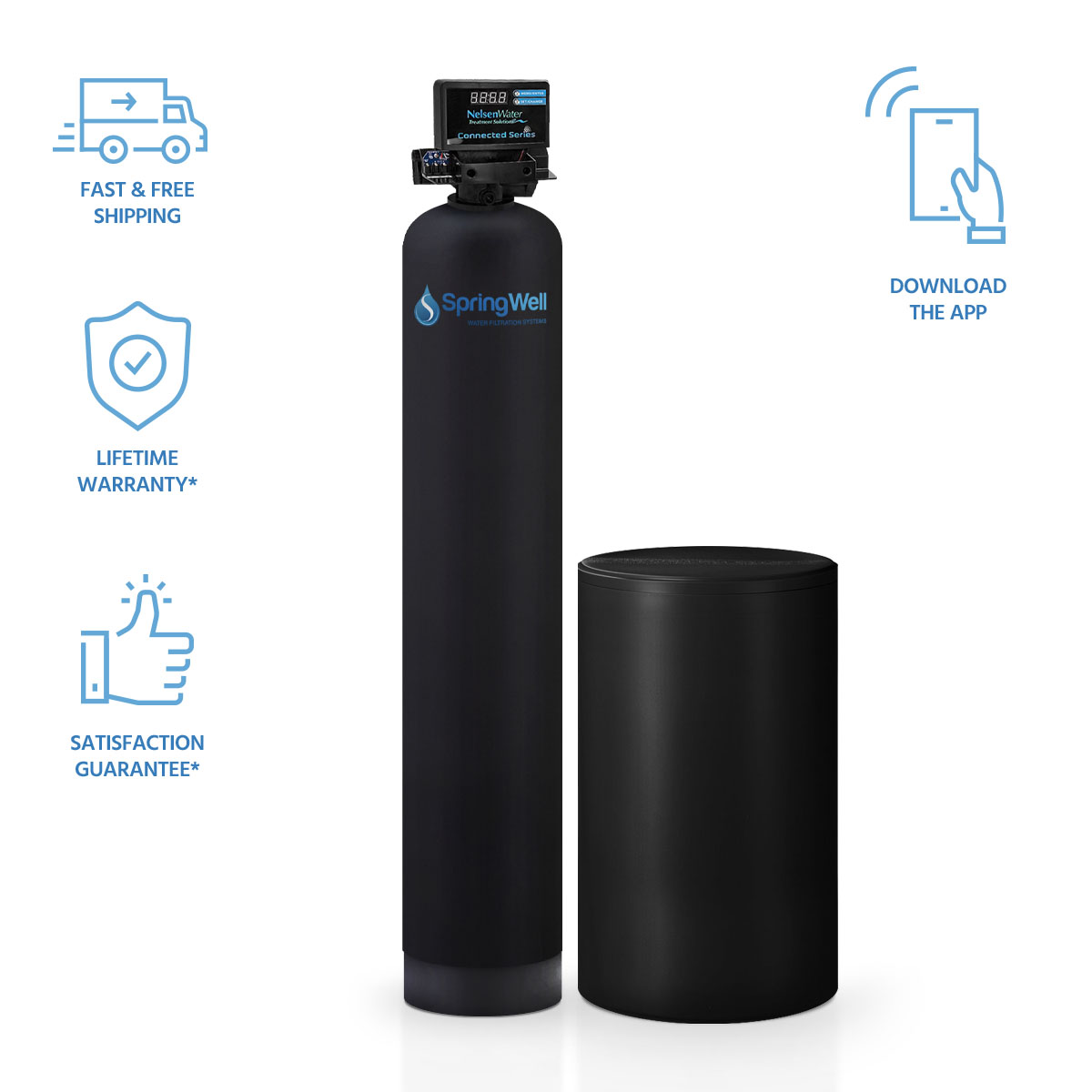
- Reviews: 5.0 out of 5 from 125+ global ratings
- Type: Salt (ion exchange)
- Capacity: 32,000 grains
Flow rate: Up to 11 GPM
- Regeneration: Metered
In terms of both dependability and performance, the SpringWell Salt-Based Water Softening System is the best in the business, hands down. Softening water with this 32,000-grain capacity system (1-3 bathrooms) is done using an old-fashioned method: the tank contains a resin bed, loaded with sodium and potassium ions, to which hard minerals are attracted. Users report no discoloration, scaling, or clogging in heaters and washing machines thanks to the SpringWell.
When it comes to cleaning the resin bed and refilling salt levels, the SpringWell has a microprocessor built-in. According to user feedback, this considerably improves productivity, allowing you to save money on salt replacements. Regeneration and backwash cycles may be started remotely from your phone thanks to the tank head’s Bluetooth capabilities. Up to 80,000 grains of softening capacity are offered for households with multiple appliances and outlets. There’s a lifetime guarantee and free delivery on all SpringWell softener products.
Scale-inducing minerals are removed from pipes, appliances, and fixtures using ion-exchange technology. Crosslink resin, which is more resistant to chlorine, is 10% more durable. The SpringWell SS can soften water for houses with one to seven bathrooms, depending on the size of the unit you choose. The Legacy View app for iOS and Android may be used to regulate digitally metered regeneration through BlueTooth tank heads. Up to 30% more backwashing efficiency may be achieved with a Vortech plate. For protection against low temperatures, wetness, and knocks, SpringWell tanks have neoprene sleeves added.
- Average-sized houses with moderate to high concentrations of hard water
- A lifetime guarantee and heavy-duty tanks for reassurance.
- Use your phone to monitor the softener’s condition, water consumption, and regeneration cycles.
Runner-up salt-based water softener
Pelican Advantage Series

- Reviews: 4.5 out of 5 from 50+ global ratings
- Type: Salt (ion exchange)
- Capacity: 32,000 grains
Flow rate: Up to 11 GPM
- Regeneration: Metered
Pelican is well-known for producing water purification systems that are both quiet and trustworthy, and can be counted on year after year. This traditional salt-based softening system has an output of 18 GPM and uses chrome-wrapped tanks that lower noise and keep the water at a constant temperature. The Advantage softener has a metered head that monitors usage and adjusts backwashing and regeneration as required—and you can manually choose from 36 various regeneration cycles.
The Pelican is one of the most powerful non-salt water softeners on the market with extensive testing, including NSF/ASNI certifications. In 99.6 percent of situations, scale growth is avoided. The maximal hardness of GPG is 75. The flow rate is fixed at 10 GPM. You can choose one of three unique regeneration cycles using the electronic control panel (metering, delayed metering, or timed). A backup battery with an 8-hour capacity is supplied.
- Average-large sized houses with moderate concentrations of hard water
- If price isn’t a concern
- Reliable brand name
Other recommended salt-based water softeners
Tier 1 Everyday Series
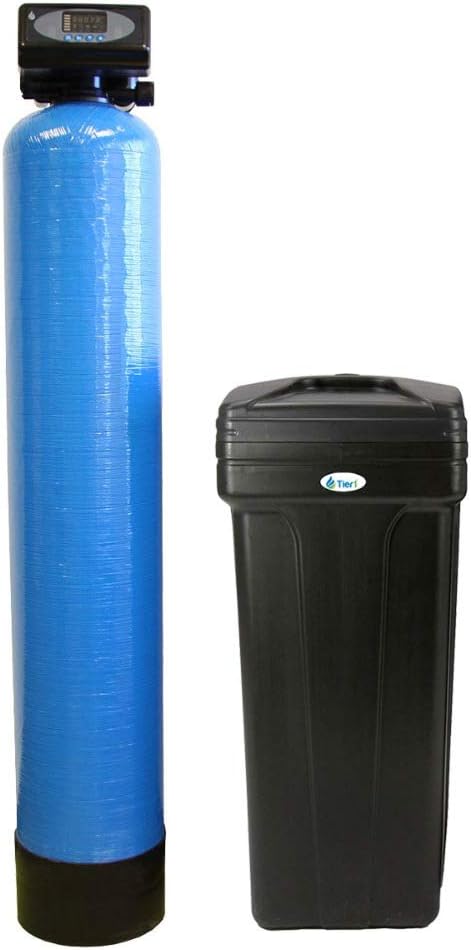
- Reviews: 4.4 out of 5
- Type: Ion exchange
- Capacity: 32,000 grains
Flow rate: Up to 11.2 GPM
- Regeneration: Metered
Tier 1’s Everyday series is an affordable water softening system with a digital regeneration mechanism, a 32,000-grain capacity, and enough flow rate for most homes.
Fleck 5600SXT
- Reviews: 4.7 out of 5
- Type: Ion exchange
- Capacity: 48,000 grains
Flow rate: Up to 20 GPM
- Regeneration: Metered
Fleck’s SXT is a lightweight, durable, and energy-efficient softener that’s simple to set up. There’s a 10-year guarantee on the tank (which comes with a brine line and safety float), and a 5-year warranty on the valve.
Best salt-free water softeners
Best salt-free water softener for well water
SpringWell FutureSoft® FS4 Water Softener
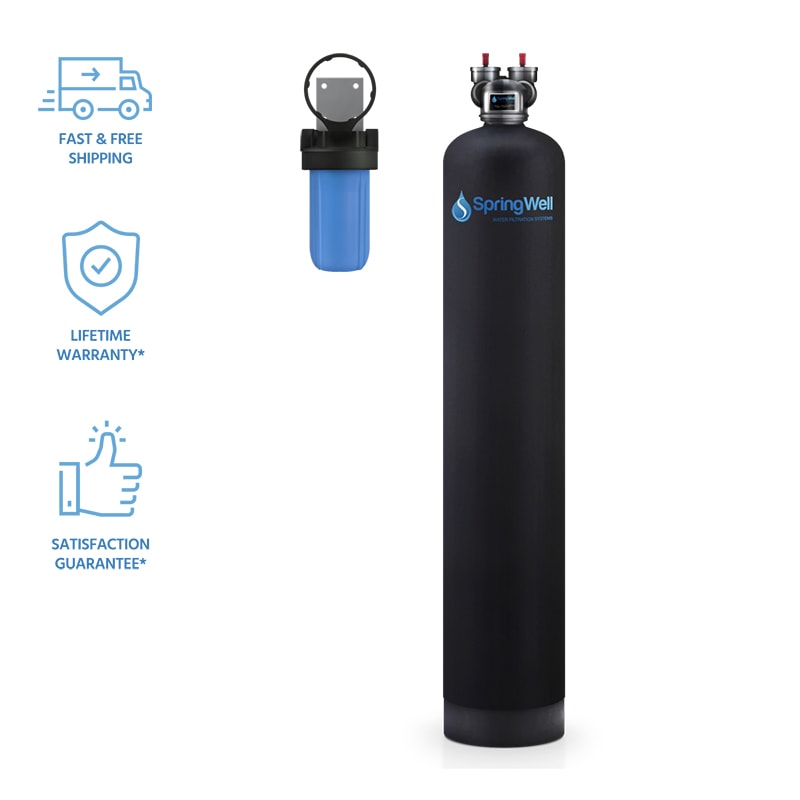
- Reviews: 4.5 out of 5 from 130+ global ratings
- Type: Salt-free (TAC)
- Capacity: Unlimited
Flow rate: 15 GPM
- Regeneration: None needed
SpringWell’s FutureSoft FS4 water softener doesn’t remove minerals from the water. Instead, it crystallizes dissolved calcium and magnesium to prevent them from binding to surfaces and causing stains or scale. Water tastes delicious and still retains healthy minerals without causing calcium buildups. The Futuresoft conditioner utilizes SpringWell’s Template Assisted Crystallization technology that eliminates the need for salt, regeneration periods, or replacement components.
Most customers reported a considerable decrease in hardness as well as a significant increase in the life expectancy of their household equipment and pipes after using this water conditioning solution to treat water with up to 81 GPG hardness. This water softener provides outstanding value for money, with a flow rate of 12-15 gallons per minute, while SpringWell’s customer service and six-month money-back guarantee are second to none.
To prevent scale from building in your appliances and pipes, the SpringWell FutureSoft uses Template Assisted Crystallization (TAC) method. There is no water waste, no salt brine is produced, and no electricity is needed.
For well water, it is necessary to filter the water before it enters any crystallization water conditioner to prevent iron from clogging the TAC media, which might cause the crystallization to fail.
- Descaling household appliances and pipelines without removing the minerals from water.
- Water treatment that does not need any regeneration or downtime.
Other recommended salt-free water softeners
Pelican Natursoft

- Reviews: 4.7 out of 5
- Type: TAC
- Capacity: > 6 years
Flow rate: Up to 10 GPM
This Natursoft conditioner is NSF-certified and comes from a world-renowned name in Pelican. It conditions water to remove s cale while beneficial minerals are preserved. You don’t need salt or power, and you won’t waste water with this environmentally friendly method of softening.
Aquasana Rhino
- Reviews: 4.6 out of 5
- Type: TAC + carbon filter
- Capacity: < 6 years
Flow rate: Up to 7 GPM
Using Aquasana’s UpFlow design, the Rhino system increases contact time between water and the filter media, helping to maintain water flow at a steady rate. Because it also includes a powerful filter, it can remove typical chemical and metal contaminants alongside hard scale.
Best water softeners for well water
Best Well Water Softener
SpringWell SS4 Iron Filter & Salt-Based Softener
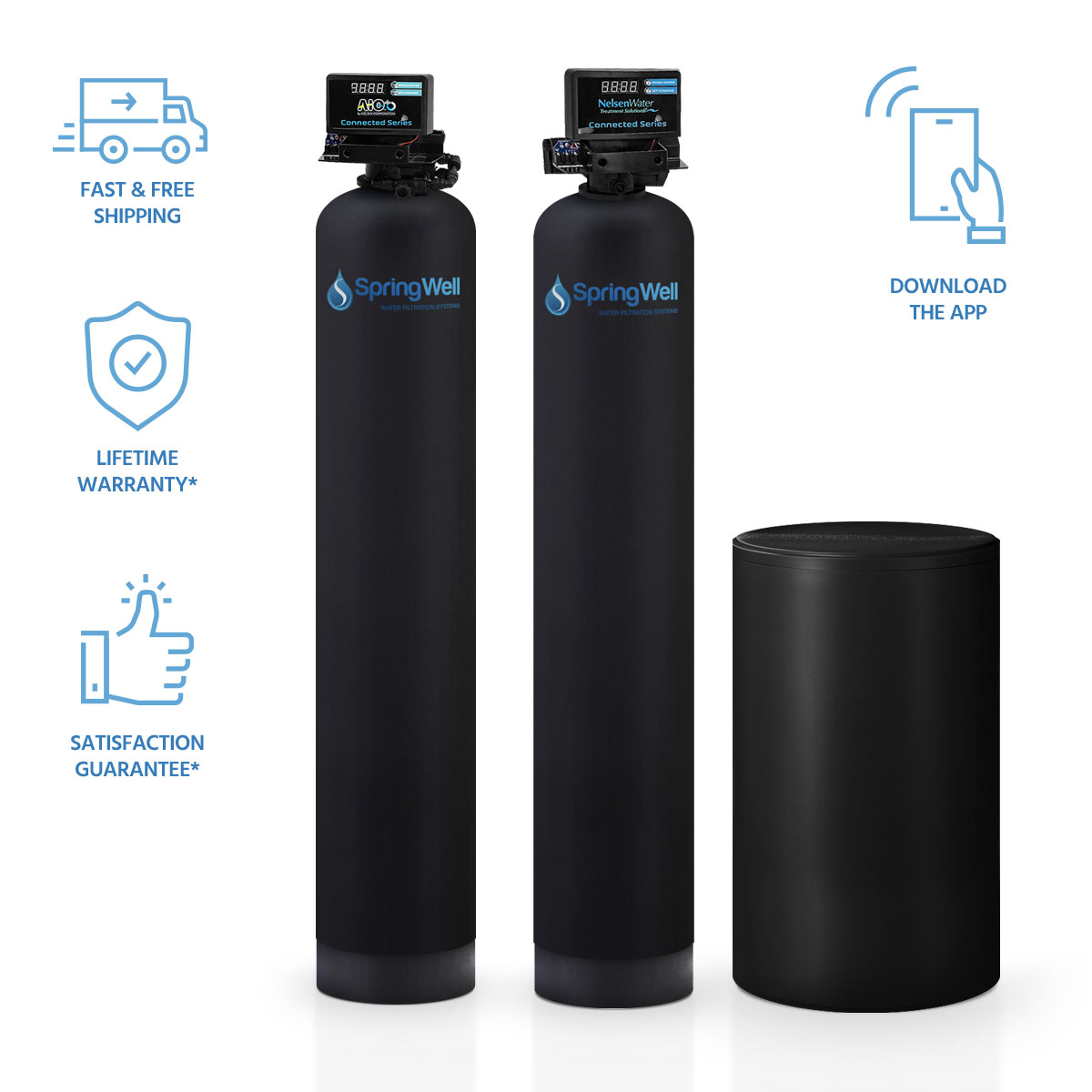
- Reviews: 5.0 out of 5 from 50+ global ratings
- Type: Salt + Air injection filter
- Capacity: 48,000 grains
Flow rate: 13 GPM
- Regeneration: Metered
This SpringWell Iron Filter and Softener is the most focused well water treatment device we’ve ever seen. It is intended to eliminate the four most frequent pollutants found in well water in the United States: iron, sulfides, manganese, and hard water minerals—reviews suggest that it does a great job of targeting all four, even when they’re present in high amounts.
This system has a 48,000-grain capacity and a metered regeneration mechanism that can be controlled using a Bluetooth-compatible tank head.
Using an air-injection filter that regenerates alongside the softener brine tank, the filter component is listed as being capable of removing 8 PPM of sulfur, 7 PPM of iron, and 1 PPM of manganese. This eliminates the need for new cartridges.
For chemical or microbiological problems with well water, more comprehensive treatment needs to be used—but if your well water is otherwise in excellent condition, this is the finest softening system from domestic well water that you can purchase.
- Treating the four most frequent pollutants found in hard well water: iron, sulfur, manganese, and hard minerals.
- Houses with 1-6 bathrooms (various softener capacities available)
Other recommended water softeners for well water (iron)
Fleck AFW Iron Pro 2

- Reviews: 4.7 out of 5
- Type: Ion-exchange
- Capacity: 64,000 grains
Flow rate: Up to 16 GPM
- Regeneration: Metered
Domestic well owners who are dealing with iron pollution and hard water should check out the Fleck AFW Iron Pro 2. It’s able to handle up to 4 ppm iron and 6 ppm manganese without any loss in flow rate.
Aquasure Harmony Series

- Reviews: 4.6 out of 5
- Type: Ion-exchange
- Capacity: 64,000 grains
Flow rate: Up to 20 GPM
- Regeneration: Metered
The Aquasure Harmony is capable of treating up to 64,000 grains of hardness at a high flow rate, as well as eliminating modest levels of iron from water. This softener has a fiberglass-lined tank and a 5-year guarantee.
Best filter-softener combos
Best filter-softener combo
Aquasana Rhino with Salt-free Conditioner
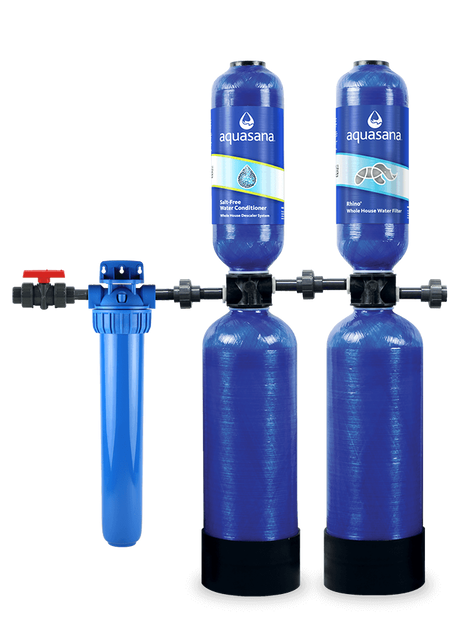
- Reviews: 4.6 out of 5 from 600+ global ratings
- Type: Salt-free + Carbon filter
- Capacity: 1,000,000 gallons
Flow rate: 7.0 GPM
- Regeneration: 6-year descaler
If you’re searching for a combination of excellent descaling and one of the best-reviewed whole-house water filters, Aquasana’s Rhino filtering system is ideal. Because it employs a water conditioner rather than a traditional salt-based tank, it can remove pre-existing scale in your plumbing system, all while protecting your home from common drinking water contaminants.
A 20″ sediment filter, a carbon filter, and a 6-year/600,000-gallon water conditioner are all included in the Aquasana Rhino + Conditioner. This means the system is able to remove tiny undissolved particles (rust, silt, dirt), as well as the typical chemical and metal well water pollutants (VOCs, pesticides, lead, mercury) and any scale caused by dissolved hard minerals.
The two tanks in the Rhino system use Aquasana’s UpFlow design, which increases contact time between water and filter media and maintains water flow at a consistent pace. This Aquasana system can run at 7 GPM, which is plenty for most people, and comes with a ten-year limited warranty.
- Powerful filtration and de-scaling without losing beneficial minerals.
- Low maintenance water conditioning (up to six years).
- Top-quality brand.
Runner-up filter-softener combo
Crystal Quest Whole House Water Softener with Pre/Post Filtration
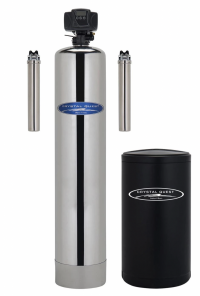
- Type: Ion-exchange
- Capacity: 48,000 grains
Flow rate: Up to 11 GPM
- Regeneration: Metered
Crystal Quest is a trustworthy and well-known brand. Adding pre- and post-filter stages to a softening system protects the water softener from clogging, allowing the resin within the mineral tank to last a few years longer. A 20″ sediment pre-filter and a post-filtration coconut-shell activated carbon block water filter are included in this softener option. This means that, in addition to softening water, the Crystal Quest also eliminates silt, chlorine, and other chemicals and organic pollutants.
With capacities ranging from 48,000 to 60,000 grains, this Crystal Quest system is available in a number of sizes to meet different applications. Made in the United States for dependable engineering, the 48,000-grain capacity is the most common size and is intended for households with 1-3 bathrooms. The Crystal Quest runs at a rate of 9-11 gallons per minute, which is sufficient for the great majority of households. The large size maxes out at a whopping 13 GPM.
Crystal Quest only provides a one-year limited guarantee, which is rather short in comparison to other manufacturers. You can also choose whether you’d prefer fiberglass or stainless steel tanks, and add on an iron air injection filter and/or a UV purifier.
- Hard water that also contains common contaminants such as chlorine and sediment.
- Houses with 1-6 bathrooms (various softener capacities available)
Best budget water softeners
Whirlpool Pro

- Reviews: 4.5 out of 5
- Type: Salt + carbon filter
- Capacity: 31,000 grains
Flow rate: Up to 8 GPM
- Regeneration: Metered
The Whirlpool Pro water softener is a great option for those who want to conserve money and floor space. This little system comprises a brine tank and water softening system, as well as timed regeneration and a 3 PPM iron filter—all for less than $1,000.
Waterboss 700 Softener System
- Reviews: 4.0 out of 5
- Type: Ion-exchange
- Capacity: 22,000 grains
Flow rate: Up to 8 GPM
- Regeneration: Metered
This budget water softening system features a metered digital head for on-demand regeneration that takes less than 30 minutes, according to reviews. The WaterBoss 700 meets the water demands of a typical 3-4 person home using standard ion-exchange technology.
Best electronic descalers
Runner-up salt-based water softener
Eddy Electronic Water Descaler

- Reviews: 4.2 out of 5 from 900+ global ratings
- Type: Electronic
- Capacity: 25 gallons
Flow rate: Up to 10 GPM
- Regeneration: Unlimited
Electric descalers are a low-cost and easy-to-install method of water conditioning. This Eddy Descaler is one of the most popular water conditioners on Amazon, with nearly 1000 customer reviews. To use this device, all you need to do is wrap the anodes around the water pipe, which allows it to reformat the structure of hard minerals so that they no longer stick to surfaces and cause scale. This eliminates the need for big tanks or tinkering with piping, which is great for rental properties.
The Eddy is warranted for life and can be used on either metal or plastic pipes. It cleans the whole water system and will even remove scale that has previously accumulated. It’s also pretty much maintenance-free, with excellent performance up to 20 GPG.
The Eddy generates an electromagnetic wave that is applied through two copper coils wrapped around the water pipe. As water passes through it’s exposed to a magnetic field, which changes the charge of hard mineral ions and prevents them from depositing on surfaces, piping, and appliances. The Eddy does not change the chemical hardness of the water or add any salts or chemicals, so you can still keep all the benefits of mineral water without the nasty sfalpreserving the positive benefits of calcium and other particles.
- Renters, apartment dwellers, and anyone who wants to descale their water without making alterations to their plumbing.
The full list: Best water softeners 2023
- Best salt-based water softener – SpringWell SS
- Runner-up salt-based water softener – Pelican Advantage Series
- Next best salt-based water softener – Tier 1 Everyday Series
- Next best salt-based water softener – Fleck 5600SXT
- Best salt-free water softener –SpringWell FutureSoft
- Runner-up salt-free water softener – Pelican NaturSoft
- Next best salt-free water softener – Aquasana Salt-Free Conditioner
- Best water softener for well water (iron) – SpringWell Iron Filter/Softener
- Runner-up water softener for well water (iron) – Fleck AFW Iron Pro 2
- Next best water softener for well water (iron) – Aquasure Harmony Series
- Best filter-softener combo – Aquasana Rhino with Conditioner
- Runner-up filter-softener combo – Crystal Quest with Pre & Post Filtration
- Best budget water softener – Whirlpool Pro Series
- Runner-up budget water softener – Waterboss Softener System
- Best electronic water softener – Eddy Electronic Descaler
Water softening systems – Buying guide
How we choose the best water softener systems
This list of the best water softeners was compiled using thorough research and our years of professional expertise. We judged products on the features consumers are most interested in, including the type of water softener, it is capacity for different family sizes, ability to also filter water and remove iron, and any unique characteristics that set it apart from competitors.
The benefits of a water softener
Homeowners with mild to heavy hard water, which may cause blocked pipes and leaking faucets, should consider purchasing a water softener. Because of the high concentration of minerals in hard water, it may cause discoloration in laundry and discoloration in dishes, as well as causing hair and skin to become dry and brittle.
All of these problems may be solved by using a water softener, which prevents heavy minerals from binding or moving through water. When you use softened water, your skin and hair regain their elasticity. Using a water softener also extends the life of your clothing and reduces the amount of time you spend cleaning. Use a water softener to :
- Safeguard your plumbing against scale accumulation
- Use fewer detergents and soaps
- save your hard-earned cash over time
- Leave your hair and skin feeling softer and cleaner.
- Clean and sanitize your clothing.
- Make dishes easier to clean
- Reduce the overall time you spend cleaning
Types of water softener
Ion exchange softeners, salt-free conditioners, reverse osmosis filters, and electro-magnetic water softeners are the 4 main categories of softeners.
Ion exchange and salt-free water softening systems have mainly been discussed in this article. But other options are out there that may be right for certain households with specific needs. Before making a purchase, it is important to analyze the differences between each type of softening system.
Salt-Free Softeners
Some of the reasons why people choose salt-free water softeners are as follows: a water conditioner does not add anything to water. A salt-free water softener does not need chemicals, salt, or potassium to do its job. The minerals in the water remain unchanged.
The difference between salt-free and salt-based softeners is that salt-free softeners just condition water, whereas salt-based softeners actively reduce water hardness. As a result, it changes the water hardening minerals, making them less effective in adhering to surfaces. This is referred to as Template Assisted Crystallization in certain circles (TAC).
The primary advantage is that no chemicals or salt are required for water conditioning. These alternatives to salt-based systems are also often less costly and easier to maintain. However, they are not recommended for use in exceptionally hard water and may not be successful in eliminating chlorine, pesticides, herbicides, and other contaminants from drinking water.
Ion Exchange Softeners
Softening water using an ion-exchange or cation-exchange water softeners is the most straightforward and traditional softening method.
Sodium and potassium ions are exchanged for water ions. This process eliminates the ions responsible for water hardness. This is a result of chemistry. Minerals have an electric charge because they are ionic.
Ion-exchange water softeners include three components:
- Softening resin is embedded with a layer of microbeads.
- Brine tank– The brine tank stores salt for regenerating the resin bed.
- On top of the resin tank, the control unit or control valve is located, which controls flow over the resin. Every water softener has a brain, and that brain controls the whole system.
Because calcium and magnesium ions have a larger positive charge than sodium, the resin bed draws them when water flows through the system. It’s yet another way to do ion exchange.
The softener’s exchange media is coated with sodium ions during this ion-exchange process. As hard water is sent through a softener, calcium and magnesium ions are exchanged for sodium ions.
In addition, it eliminates these hardness ions, which reverses the effects of the water. You’ll save money in the long run if you keep your appliances in good working order by keeping them clean and dry at all times
Reverse osmosis softeners
Reverse osmosis softeners work by forcing pollutants through a semi-permeable membrane. Using reverse osmosis eliminates up to 98 percent of pollutants such as fluoride and minerals from water.
Reverse osmosis filters purify water more effectively than most types of water filters. They also reduce hard minerals, though at a much slower rate than softener-specific devices.
If you don’t mind the restriction in flow rate, using reverse osmosis produces highly pure water in your house. It’s possible to receive bottled-water grade water directly in your own house. Filters should be replaced every 6 months to a year. The system may last 10-12 years.
Electromagnetic softeners
If you don’t have access to an electrically powered resin-based ion exchange water softener, you may want to consider using a magnetic device, which softens water by passing it through a magnetic field.
The concept behind this system is to place a strong magnet on the outside of your pipe; the magnet will draw or change the ions in your water before it reaches your home’s plumbing system. Flowing water is best for this method—it doesn’t function on stationary water, such as water in a tank.
Do I Need a Water Softener?
To find out levels of water hardness in your region, look at the water hardness map or perform a home water test. Before you choose which system to install, be sure it can address your unique water hardness issues.
The following are some of the most typical indications of hard water:
Scale deposits in pipes and appliances
There are several problems associated with hard water, but scaling is the most common one. Why? Because the accumulation of scale deposits can clog anything from plumbing fixtures to hot water appliances and even whole home water systems.
Scaling causes water flow rates and pressure to decrease over time. Eventually, pipes will wear out, your dishwasher will leak, and the lifespan of your appliances will be reduced by a few years.
Look for signs of scale on the heating elements of washing machines, water heaters, coffee makers, etc.
Staining
Hard water, when combined with soap, causes unattractive stains on any surfaces it comes into contact with, including bathroom fixtures, shower trays and doors, kitchen appliances, and plates and glasses.
Shampoos and soaps not lathering
The mineral composition of hard water affects the way that soaps and detergents lather, meaning that you won’t get the same frothy bubbles you might usually expect. You’ll also likely need to spend more money on laundry and shower products.
Scratchy Laundry
The same properties of hard water that make it difficult for soaps to lather can also affect the integrity of clothing and bedding. When repeatedly washed in hard water, fabrics can become though, scratchy, and faded.
Dry skin & hair
Many people complain of dry skin and hair after bathing in water with high levels of hard minerals. You may also find it more difficult to wash soap from your skin.
How to Install a Water Softener
Most water softeners come with a handbook, so reading the user guide is a good place to begin. Installing a water softening system might require professional input, so it’s important to have a good grasp of basic plumbing or other home maintenance skills if you’re planning to install it by yourself.
Regardless of the system, the installation process for most softeners follows the same or comparable procedures:
- Before you begin, make sure you have all the necessary supplies and a level surface where you can set your unit. Ensure that the platform is flat and dry.
- Measure the system to determine how much of your water line you’ll need to remove, then cut the pipe and connect the softener input and output fittings.
- The next step is to attach and program the water softener head and connect the discharge line in accordance with the manual’s directions.
- Before filling your softener, it is necessary to turn on all of the water outlets in your home. In addition, shut off the electricity and water heater.
- Once everything’s ready and you turn the power and water back on, you should initiate the backwash stage of your softener.
- Allow the conditioner to run through the backwash cycle while you finish things off. Your screws and nuts should be tightened to the point where they won’t come loose, and any plastic threading should be lined with Teflon Tape.
- Lastly, examine the installation for any leaks.
How much do water softeners cost?
Type, size, brand, and other features all factor into how much a water softener will cost.
A basic ion exchange system might cost anything from a few hundred to a few thousand dollars. Water conditioners tend to be less expensive.
Don’t forget to factor in the costs of installation and ongoing maintenance, including the price of periodic salt replacements.
Remember that a water softener will pay for itself in the long run when your household appliances and pipes are still in perfect shape years down the line!
Finding Your Hard Water Level
To find out how hard your water is, all you have to do is check its calcium content.
To test your water hardness, buy a hardness test kit (online or at your local hardware shop) or mail a sample to an independent or local college lab.
However, the simplest method for determining your hard water level is to check your water supply’s most recent Water Quality Report. All public suppliers in the US are required to produce this annual report that breaks down the makeup of their water in exact detail. This includes contaminants, risks, and mineral composition.
If you get your water from a private domestic well, then there is no water quality report to refer to, so you’ll need to perform your own tests.
Over half of American households have water that is moderately or severely hard, according to the USGS.
Salt-based softeners vs. Salt-free water conditioners
Experts generally agree that water softeners are superior at removing scale than salt-free water conditioners. This is because they tend to be more effective at treating water with a greater hardness level.
But salt-free water conditioners have their legitimate use cases. They have a number of benefits, such as:
- Conditioners can remove pre-existing scale deposits in a plumbing system
- Conditioners require little upkeep.
- You don’t have to deal with cumbersome salt bags
- People on a salt-restricted diet will appreciate the fact that no salt is added to the water – also good for the environment and sewage systems
- There is no need for regeneration, thus there is no downtime and no waste
Maintenance
In general, a water softener is easy to maintain. The key task is adding additional salt to the brine tank when the system begins to run low. However, you can do more to guarantee that your system functions smoothly and efficiently:
- Once a year, drain and clean the brine tank, then set the regeneration timer for the next night.
- Resin cleanser is recommended for water that has significant concentrations of iron, manganese, or tannins.
- Remove salt bridging or mushing from the brine tank if necessary.
- Make sure the float switch is able to move freely.
- Every few months, inspect the brine injector.
- O-rings should be inspected and replaced if necessary.
- Maintain the bypass valve’s lubrication by exercising it.

Best water softener FAQ
How do water softeners work?
Resin beads coasted with sodium and potassium (which have a negative ion charge) are used in water softeners to trap the calcium and magnesium ions that contribute to water hardness (which have a positive charge). While the water runs through the resin bed and into your home’s plumbing system, these particles cling to the resin and leave the water supply.
How do you clean a water softener?
Water softeners need to be regenerated regularly to keep working. This is the “cleaning” procedure for the resin bed. The resin bed gets covered with calcium and magnesium granules and can no longer bind particles. The system will usually monitor water use and renew the bed as required.
A brine rinse and backwash regenerate the resin bed. A salt tank connected provides sodium for the brine bath that cleans the resin bed.
If your system isn’t working properly and you’re getting hard water from your pipes, a salt bridge may have developed. This is a crusted salt coating that inhibits salt from accessing the brine tank and eliminating hard minerals. Activate the bypass valve to divert water from your softener system. Wet-vac the water in the tank after breaking up the crystallized salt with a broom handle or other implement.
To clean a water softener:
- empty the tank of all water and salt
- remove the brine grid from the tank’s foundation
- scrub the tank’s inside with warm soapy water
- rinse with plain water
- fill the tank with 14 cups of household bleach and 2 to 3 gallons of water
- let this mixture remain for 15 minutes
- rinse the reservoir again, reinstall the brine grid
- refill with water and salt
Maintain your water softener to enhance water quality and prevent mineral accumulation from lowering water pressure
How long do water softeners last?
The duration of a water softener is determined mostly by the resin bed. A salt-based water softener’s resin bed typically lasts 10-20 years. The life of your water softener depends on water hardness and consumption. Hard water and regular regeneration might limit the life of your water softener’s treated resin.
Is soft water bad for copper pipes?
Due to soft water’s mineral deficiency, it can suck minerals such as copper from uncoated metal pipes. If left unchecked for long periods of time, this might lead to pinhole leaks (although lined pipes are not under threat).
Do you need a water filter if you have a whole house softening system?
Can soft water be used as drinking water?
Water that has been softened is not always pure water. It is recommended that you filter it before drinking it. A reverse osmosis system or a carbon-based filter are both excellent options for providing clean drinking water in your home.
Does reverse osmosis water filter soften water?
Reverse osmosis water filters are so effective that they will soften water as well. However, their rigorous filtration systems often limit flow rate, meaning they’re not the optimal device to use if your more interested in water softening that filtering.
Can soft water be healthy to drink if it lacks beneficial minerals?
It’s true that the tiny amounts of magnesium and calcium found in hard water do contribute to recommended daily intake levels of these minerals. Due to the lack of beneficial minerals, soft water is technically less healthy, although the difference in health benefits between hard and soft water is likely to be very small.
Affiliate Disclaimer: Cleancoolwater.com is proud to be a reader-supported website. To keep our content free, we may earn small commissions when you click on a link or buy products through our pages. Commissions do not affect our review process.



